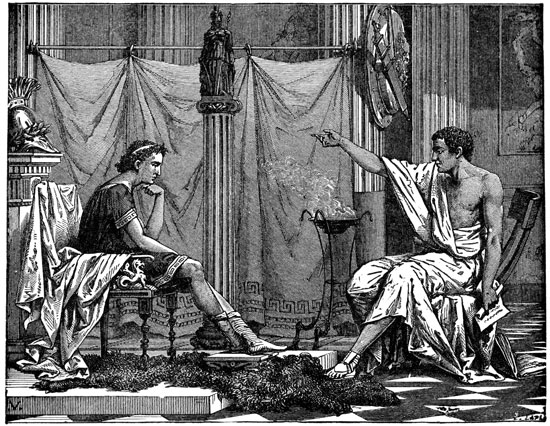 There’s this passage toward the end of the all-important book XII of Aristotle’s Metaphysics that I keep coming back to, one of those bits that reaches out of its antiquity and walks among us. Book XII is where Aristotle’s account of the world beyond physics reaches up from the chains of causes acting on causes all around us up to the heavens and then to the first cause, the unmoved mover—or movers—that he concludes must be up there somewhere. This mover is the basis for a great many attempts even now to prove the existence of God.
There’s this passage toward the end of the all-important book XII of Aristotle’s Metaphysics that I keep coming back to, one of those bits that reaches out of its antiquity and walks among us. Book XII is where Aristotle’s account of the world beyond physics reaches up from the chains of causes acting on causes all around us up to the heavens and then to the first cause, the unmoved mover—or movers—that he concludes must be up there somewhere. This mover is the basis for a great many attempts even now to prove the existence of God.
My passage concludes a particularly confounding chapter in the book—chapter 8—where he goes back and forth between whether there is one mover or many, a process which requires some weird resorting to prime numbers and the momentary conclusion that there are either 47 or 55 movers, only then to determine that there can be only one. Irrespective of that, however, he is quite satisfied to accept that the stars which these movers move are themselves eternal, and indeed are actually eternal gods. It’s obvious to his astronomy and his reason. And that’s where we begin:
We should also consider tradition. From old—and indeed extremely ancient—times there has been handed down to our later age intimations of a mythical character to the effect that the stars are gods and that the divine embraces the whole of nature. The further details were subsequently added in the manner of myth. Their purpose was the persuasion of the masses and general legislative and political expediency. For instance, the myths tell us that these gods are anthropomorphic or resemble some of the other animals and give us other, comparable extrapolations of the basic picture. If, then, we discard these accretions and consider the central feature, that they held the primary substances to be gods, we might well believe the claim to have been directly inspired. We might also conclude that, while it is highly probable that all possible arts and doctrines have been many times discovered and lost, these ancient cosmologies have been preserved, like holy relics, right up to the present day. It is these, and these alone, that we can know clearly of the ancestral—indeed primordial—beliefs. (Translated by Hugh Lawson-Tancred; Penguin, 1998.)
Why does this strike me so eerily? However much scholars today would like to forget it, the modern study of religion was founded on just this impulse. It was the hope of figures like Mircea Eliade, Carl Jung, and Joseph Campbell to take the myths and ritual of the “primitive” imagination and, by comparing and contrasting, synthesize for ourselves the truth buried under all the fluff, the essential archetypes that are real beneath, as Aristotle puts it, the “extrapolations” and “accretions.” There’s a noble ambition in such historical phenomenology, even though, as in the case of Aristotle’s eternal stars, it can be as mistaken as the mythologies themselves: to rescue the absurdities of one’s ancestors from themselves and find in them the truth that couldn’t be adequately appreciated earlier. Well, says Aristotle, now we can. This is what gods actually are and always have been: stars. Those wild mythologies are messengers, carrier pigeons whose messages now we can finally open. We need not declare war against our traditions, though they be false, for we can distill the truths hidden in them.
Speaking of war—as Alexander the Great traipsed across the Mediterranean and the steppes and the deserts building his great empire, he kept two things under his pillow: a dagger, and a copy of the Iliad that his teacher Aristotle had given him. Now Alexander wasn’t such a great student; born conquerors like him know early on that they won’t have much need for syllogisms. Gathering as much, the teacher didn’t bother giving his student any of his subtle philosophy, like the Ethics or the Organon, for the road. He gave him a good story. A mythology, about battle and glory and love and gods, and Alexander loved it enough to take it along.
Alexander conquered everything he saw, but of course after his death at age 32, the empire he built crumbled in the rivalries of his generals. It was fleeting, though its legacy was not. Those conquests spread Greek culture around the known world. As Alexander was clinging to his knife and his war stories, he was making way for scholars from Egypt to Persia to study his teacher’s delicate arguments, though they hadn’t stuck with Alexander himself. He, whether he knew it or not, with mythology under his pillow, was the carrier pigeon.
Comments
3 responses to “The Truth in Myth”
in regards to alexander:
so, scholarship is a religion based on a religion of war based on a religion of war based on a religion based on astronomy, which is truth.
Yeah, but when your astronomy’s crap, as was Aristotle’s the whole thing’s a mess. Especially the war.
[…] TickerNathan on The Truth in Mythjake on The Truth in Mythmandy on Do You Believe in Mother God?Child123 on Do You Believe in Mother […]